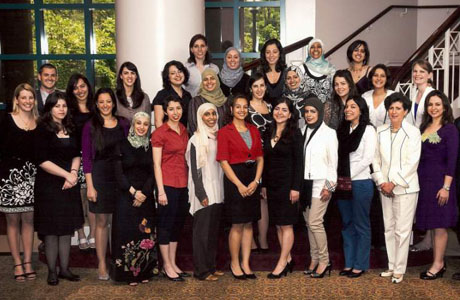Empowering Women
During this period of promise and uncertainty, MEPI’s Women’s Empowerment projects are helping women throughout the MENA region reach their enormous potential. MEPI projects assist women seeking greater political and economic participation, provide training to enhance women's capabilities to contribute to reforms and change, and build the capacity of civil society to secure equal rights and opportunities for women.

The MEPI-funded Online Activism Institute’s (OAI) Jordan graduation.
Project Examples:
TUNISIA - The MEPI-sponsored "Get Out and Vote" project encouraged women of all ages and educational backgrounds to vote in Tunisia's October 2011 democratic elections. Participants learned how to engage the media to increase coverage of women’s campaigns. Over a dozen female participants in this project were elected to the new Tunisian National Constituent Assembly.
EGYPT - Women from all walks of life played key roles in the protests that led to the resignation of President Mubarak. Despite their prominent role in the revolution, women continue to face significant challenges including keeping women’s rights issues at the forefront of the democratic reform agenda and ensuring that women are represented equally in decision-making bodies. MEPI’s programs help Egyptian women build political leadership and advocacy skills as well as strengthen the role of women in business and the new economy. For example, MEPI partners are working with civil society organizations, journalists, and activists to raise attention to gender issues within the newly-elected legislative bodies. Specifically, MEPI activities support efforts to bring women into the constitution-drafting process and help activists lobby for gender equality in the articles of the new constitution.
LIBYA - In Libya, some of the most promising and effective civil new society organizations have been founded by women. MEPI provides support to these organizations and other nascent non-governmental organizations (NGOs), as well as to businesswomen, entrepreneurs, and aspiring political leaders, including women who plan to compete in Libya's upcoming elections. Ensuring that women are active participants in social and political life is a point of emphasis for MEPI’s programming in Libya.
REGION-WIDE - MEPI’s work in these three transitional countries is illustrative of our region-wide focus on empowering women and girls. MEPI supports the new Arab Women's Leadership Institute, which is training MENA’s female leaders, both elected officials and civil society, in coalition-building and advocacy skills. The ongoing Middle East and North Africa Businesswomen’s Network (MENA BWN), established with MEPI funding in 2006, partners businesswomen’s associations in 11 countries in the region. MENA BWN direct membership has grown by 380% to over 2,100 businesswomen, and local BWN hubs have hosted over 200 events reaching 14,000 people in support of women entrepreneurship, and garnered significant private sector support.
ALUMNAE - MEPI is proud that many alumnae are prominent political leaders, including: the 2011 Nobel Peace Prize Laureate and Yemeni women’s rights champion Tawakul Karman; Egyptian activists Dr. Azza Kamel, Esraa Abdel Fattah Nehad Aboul Komsan, and Hala Fawzy (the newest members of Egypt’s National Council for Women); the first four women to be elected to Parliament in Kuwait; and the thousands more women who continue to advocate for democratic reform.
On Supporting Women...
-

"Investing in women and girls is good for societies, and it is also good for the future prosperity of countries. Women drive our economies. They build peace and prosperity and political stability for everyone—men and women, boys and girls. So let us recommit ourselves to a future of equality. Together, we can ensure that all people everywhere have the opportunity to live up to their God-given potential."
Secretary of State Clinton - March 8, 2012



